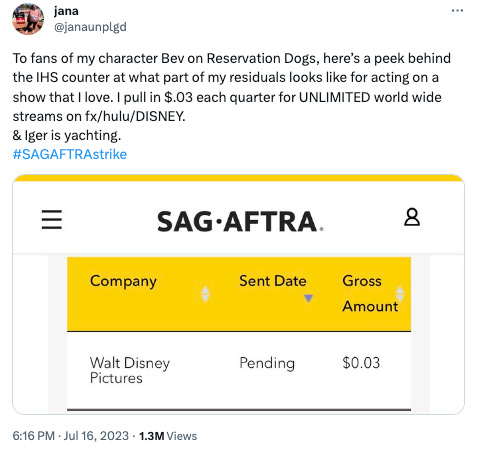Why It Is CRUCIAL For Americans to Support the Hollywood Strike.
Yes, some actors are millionaires. Regardless, we should still support them.
Welcome JoeWrote readers! I’ve got good news and bad news. The bad news is that, unfortunately, I’ve had to put this article (and many others like it) behind a paywall. I wish everything I wrote could be free for all, but the reality is producing this content is quite laborious, and I’ve got bills to pay.
The good news, however, is that you can unlock this full article, as well as everything else I write for just a quarter. An annual JoeWrote subscription cost $30, meaning every piece I produce will cost you less than .25 cents. If you think reading this article — as well as supporting the work that goes into making JoeWrote happen — is worth ¢.25, then I would encourage you to become a premium subscriber today.
Thank you for your support! Without it, JoeWrote wouldn’t exist.
In Solidarity — Joe
Last week, the Screen Actors Guild-American Federation of Television and Radio Artists (SAG-AFTRA), the union representing TV and movie actors, announced they would be going on strike. Not long after the announcement, some of the most famous celebrities in the world joined the Writer’s Guide of America (WGA) on picket lines outside of Hollywood’s iconic production studios. As actors are highly visible, often famous, and assumed to be highly paid, many commentators derided SAG-AFTRA as nothing but a group of greedy millionaires seeking more money and attention. A few of these very-poor takes can be seen below.
While many might share the impulse to roll their eyes at the notion that stars like Hillary Duff and George Clooney need higher pay, this strike is not for the A-Listers. In fact, millionaire status is relatively rare in the entertainment industry. But salary comparisons aside, it’s important for those who care about working-class politics to support the strike and reject Capital’s attempts to divide the working class by claiming SAG-AFTRA is comprised of spoiled millionaires. It’s a tried-and-true tactic of Capitalists to protect their interests by turning workers against each other through immaterial differences, such as race, gender, and place of origin. The attempt to posit the striking actors as “greedy” is no different, and will surely be used to quase the labor action of less-visible workers in the future.
Actors Are Workers, Too
But the need to build a unified working-class political movement isn’t the only reason to support the Hollywood strike. While celebrities are known to bring in the big bucks, most actors are far from wealthy. According to the Bureau of Labor Statistics, the median actor makes $17.94 an hour, only $1.16 above LA’s minimum wage. And as many striking performers have noted, it is common for actors to go months or years without work, forcing them to live off of their savings and residuals, which are also shockingly low.
Due to the high visibility of their employment and the seven-figure salaries some of their co-workers earn, it’s often assumed actors, athletes, writers, and other entertainment workers are free from the exploitations of Capitalism. And though some entertainers have accrued life-changing wealth, large portions of these professions exist as members of the proletariat. For example, after Buffalo Bills safety Damar Hamlin nearly died during a Monday Night Football game last season, many were shocked to learn that he hadn’t met the NFL’s requirements for post-career health insurance. A similar dynamic exists for actors. According to SAG-AFTRA board member Shann Sharma, only 12.7% of the union’s members meet the $26,470 income requirement for health insurance. (That means 87.3% of actors earn under $26k annually.)
But regardless of how much a group of striking workers is paid, it is always important for the Left, or even those who care about workers’ rights, to support their struggle. Whether a worker is paid $7.25 an hour to flip burgers or $500 to guest star on NCIS, they are still a worker: as they do not control their workplace, they do not control their lives. Just as Disney’s CEO Bob Iger has omnipotent control over the lives of minimum wage amusement park employees, he dictates the livelihood of the cast of How I Met Your Father. He could cancel their show, dooming them into the realm of Has-Been’s, he could force them to work long hours under dangerous conditions, or, as Hollywood is notorious for, he could use his power to coerce them into more nefarious acts.
Regardless of how the unjust power dynamic of bosses over workers materializes, whether it be legal exploitation or illegal sexual coercion, it is crucial for us to challenge this imbalance wherever it exists. A benevolent tyrant, even one who pays or treats his subjects well, is still a tyrant.






